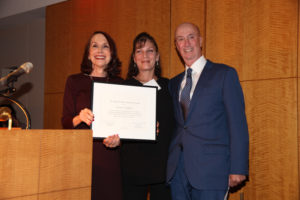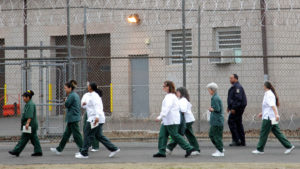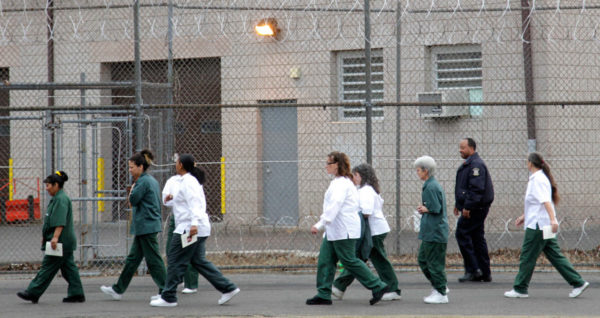On the morning of Jan. 21, 1993, Niki Rossakis shot and killed her severely abusive husband. In 2017, after serving over twenty-five years and being denied parole three times despite an impeccable prison record, Niki was finally granted parole—and in the process helped to inspire a movement to help other incarcerated women and to reform the parole process itself.
In early 2017 Niki Rossakis, a Queens native who fatally shot her severely abusive husband in 1993, was scheduled for a new parole hearing after a state appellate court ruled, on November 10, 2016, that the parole board’s decision denying her parole for a third time was “so irrational as to border on impropriety and [was] therefore arbitrarily and capriciously rendered.” Others may not have taken a second glance at this appellate victory, but to Sanctuary Legal Center Director, Dorchen Leidholdt, and Weil Gotshal Senior Counsel, Richard Rothman, the opinion and the new parole hearing for Niki carried the possibility of becoming monumental.

Niki’s husband, Gary Rossakis, had been severely physically and sexually abusive to her throughout their marriage. In 1993, despite being advised to refrain from sex while she was healing from a medical procedure, Niki’s husband sexually assaulted her and threatened to rape her. Convinced that he was going to kill her, Niki shot and killed her husband with one of the many guns he possessed – guns that he had used to threaten her in the past. Niki was convicted of murder in the second degree and sentenced to 24 years to life. On appeal the sentence was reduced to 15 years to life.
During her time in prison, Niki proved that she was worthy of parole. She completed two associate degrees and multiple rehabilitative programs, obtained intensive trauma-informed therapy, received offers of a job and housing upon release, and achieved the best possible score on her COMPAS Evaluation – which tests one’s inclination to resort to violence, substance abuse, and/or criminal behavior. Even after accomplishing so much, however, Niki was denied parole on three separate occasions in 2009, 2011, and 2013. Each time the parole board asserted that Niki failed to articulate remorse because of her continued assertions that she was a victim of domestic violence. Niki’s hopes of parole seemed to diminish with every passing year.
“THE INITIATIVE”
Help finally arrived in 2016 when Dorchen Leidholdt, Legal Director at Sanctuary for Families, and Richard Rothman, Senior Counsel at Weil Gotshal and Manges LLP, became interested in the case and offered to represent Niki at her next parole hearing. When asked how he became involved, Richard Rothman said it was simply a matter of wanting to help:
“I first heard about Niki Rossakis from Dorchen Leidholdt, who I believe had learned about Niki from the co-chair of Sanctuary’s PBC. Dorchen called to ask her if she needed representation after having been denied parole three times, and then travelled to the Taconic prison in Bedford, New York, to meet with Niki on a Saturday. Dorchen asked me if I could work on the case with her, and I jumped at the opportunity.”
Earlier that year, an Article 78 petition seeking a new parole hearing had been filed on Niki’s behalf, which Judge Alice Schlesinger approved. In January 2017, with the pro bono representation of Sanctuary and Weil Gotshal, the Parole Board finally granted parole to Niki after more than twenty years in prison. Inspired by their success, Leidholdt and Rothman founded the Initiative for Incarcerated Survivors of Gender Violence with the hopes of improving the parole system for survivors of gender violence.

The Initiative for Incarcerated Survivors of Gender Violence (“the Initiative”) is a collaboration among legal and social services organizations, law firms, advocacy groups, former judges, formerly incarcerated survivors, and other individuals committed to assisting survivors of gender violence currently serving prison time in New York State.
“As a leading advocate and service provider for victims of gender-based violence, Sanctuary is proud to be a founding member and co-chair of the Initiative, and excited to be involved in this critical work.”
Since its founding in 2017, the Initiative has grown into a multi-faceted program, while maintaining its devotion to incarcerated survivors. The Initiative works to achieve three main goals:
(i) To provide representation in matters relating to parole; (ii) Engage in advocacy to improve the justice system’s approach to parole release decisions for incarcerated survivors; and (iii) To provide education and training on issues of gender-based violence for those involved in parole and clemency decision-making. These three main pillars are designed to help survivors like Niki Rossakis get the legal counsel and parole preparation that is needed before their hearings.
WHY IT ALL MATTERS
Although it may seem as though Niki’s case is highly individualized, the reality of the matter is that most incarcerated women have been subjected to physical and sexual abuse during childhood or adulthood.[1] As victims of gender violence, but also as perpetrators of violent crimes, they face a complicated and often misunderstood battle in seeking parole. More times than not, the parole board does not grant parole due to a variety of reasons, which include failure to admit remorse and responsibility, need for rehabilitation, and chances of recidivism. As was illustrated in Niki’s case, the parole board tends to misconstrue identification as a victim as the opposite of remorse. This becomes especially problematic once factors such as the prevalence of PTSD among survivors are introduced. Such realities make gender violence survivors a unique subset of the prison population for whom special assistance, like the Initiative, is essential.

Currently, the Initiative relies on pro bono legal services, which are provided by Davis Polk, Latham & Watkins, Paul Weiss, and Weil Gotshal. Representatives from each of the firms partner with members of the Initiative, who train and mentor the attorneys. Because there is no right to counsel for parole applicants, many individuals eligible for parole prepare for their interview on their own, which, unfortunately, becomes a scary, overwhelming, and sadly unsuccessful endeavor. In order to mitigate this issue, and assist with the training of volunteers and attorneys of the Initiative, Sanctuary has created a Parole Training Manual and a complementary Resource Library, both of which aim to increase awareness and knowledge for the incarcerated subjects of gender violence.
ADVOCACY
In addition to creating change through legal representation, Sanctuary is also working on behalf of incarcerated survivors of gender-based violence by meeting with those involved in the parole and clemency decision-making process. This includes recent meetings with Alphonso David, the Governor’s Counsel, and Tina Stanford, Chairwoman of the Board of Parole, as well as an upcoming training for all of the Parole Board Commissioners. These meetings have resulted in positive outcomes, including expressions of interest and excitement about working with us. We look forward to continuing to partner together with individuals in the Governor’s office and within the Department of Corrections and Community Supervision on matters of parole and clemency.
MAKING IN-ROADS AT TACONIC CORRECTIONAL FACILITY

Lastly, Initiative volunteers have reached out to Taconic Correctional Facility to assist in identifying potential clients as well as allowing us to provide parole preparation and gender-based violence training. According to Sanctuary staff and member of the Initiative, meetings with the superintendent at Taconic have gone well. According to Nicole Fidler, Director of Sanctuary’s Pro Bono Program,
“We are very fortunate to have the support of Taconic Correctional Facility’s new Superintendent, Tanya Mitchell-Voyd. She has met with us twice and has encouraged us to engage with both the staff at Taconic and with the women incarcerated at Taconic. Building partnerships with Correctional Facilities in New York is critical to our ability to effectively serve incarcerated survivors.”
Leidholdt and Sanctuary Clinical Director and Initiative member Laura Fernandez recently conducted a training on gender-based violence for staff at Taconic Correctional Facility. The Initiative hopes to continue partnering with Taconic to conduct trainings and outreach.
Although there is still a long road ahead, we are confident that our work will soon produce tangible change in not only the parole hearing process, but the lives of those who are have been affected by this complicated and dated process.
[1] In one study of women incarcerated in Bedford Hills Correctional Facility, it was found that 82% had been severely physically or sexually abused as children and 93% of women convicted of killing sexual intimates – current or former husbands, boyfriends or girlfriends – had been physically or sexually abused by an intimate.
